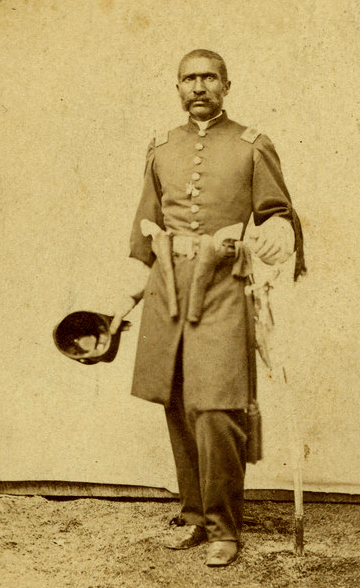- Mar 11, 2015
- 94,873
- 79,136
- 3,645
I read consistently the ignorance of racists here about whites dying to free us from slavery.
That claim is classic historical revisionism.
First to Serve-1st Kansas Colored Infantry Regiment

Captain William Mathews
During the celebration of the Emancipation Proclamation on January 1, 1863 at Fort Scott, Kansas, Captain William D. Mathews, commanding Company D of 1st Kansas Colored Volunteer Infantry Regiment, gave a speech highlighting the opportunity for blacks to fight in the Civil War (1861-1865). He declared: "Today is a day that I always thought would come …Now is our time to strike. Our own exertions and our own muscle must make us men. If we fight we shall be respected. I see that a well-licked man respects the one who thrashes him."
The 1st Kansas Colored Infantry first saw combat at the Battle of Island Mound in Missouri on October 29, 1862. In this skirmish, roughly 225 black troops drove off 500 Confederate guerillas.
Freedom was their Cause
African Americans served in the Union Army for many reasons, and it is clear that the efforts of more than 180,000 black soldiers directly contributed to Union victory.
That claim is classic historical revisionism.
First to Serve-1st Kansas Colored Infantry Regiment
Captain William Mathews
During the celebration of the Emancipation Proclamation on January 1, 1863 at Fort Scott, Kansas, Captain William D. Mathews, commanding Company D of 1st Kansas Colored Volunteer Infantry Regiment, gave a speech highlighting the opportunity for blacks to fight in the Civil War (1861-1865). He declared: "Today is a day that I always thought would come …Now is our time to strike. Our own exertions and our own muscle must make us men. If we fight we shall be respected. I see that a well-licked man respects the one who thrashes him."
The 1st Kansas Colored Infantry first saw combat at the Battle of Island Mound in Missouri on October 29, 1862. In this skirmish, roughly 225 black troops drove off 500 Confederate guerillas.
Freedom was their Cause
African Americans served in the Union Army for many reasons, and it is clear that the efforts of more than 180,000 black soldiers directly contributed to Union victory.
